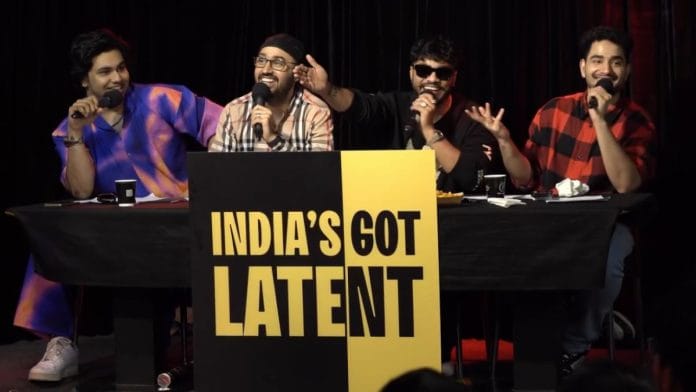New Delhi: The Supreme Court Monday frowned upon insensitive remarks demeaning individuals, especially those with disabilities, saying such comments should not receive constitutional protections, and the person commenting can not claim to be exercising free speech rights.
“Any speech meant to demean another community … if there is such a kind of liberty, we will curtail it (sic),” observed a bench of justices Surya Kant and N. Kotiswar Singh.
Hearing a petition accusing stand-up comedians Samay Raina, Vipul Goyal and three others of insensitive jokes that defame individuals with disabilities, including those with visual impairments and spinal muscular atrophy, the bench summoned five stand-up comedians from the YouTube show India’s Got Latent.
The bench, expressing concerns over jokes ridiculing vulnerable groups gaining popularity on social media platforms, ordered Raina and Goyal, along with stand-up comedians Balraj Paramjeet Singh Ghai, Sonali Thakar aka Sonali Aditya Desai, and Nishant Jagdish Tanwar, to be personally present at the next hearing.
The bench ordered the Mumbai police chief to ensure their presence in court, giving the officer the liberty to take coercive action to ensure the stand-up comedians complied with its directions.
Non-profit outfit Cure SMA India Foundation earlier moved the Supreme Court for directions to the government to frame guidelines for all media platforms to protect persons with disabilities from “disabling humour”, drawing the bench’s attention to the jokes by the five.
The foundation filed an intervention application in response to the Ranveer Allahbadia case, where the YouTube podcaster had asked the court to quash the obscenity FIRs filed in various states over his comments in an episode on the now-discontinued India’s Got Latent show.
When informed about the nature of the jokes, the bench observed it was “unfortunate” that, citing free speech, people continued to write what affected others.
Senior advocate Aparajita Singh, appearing for the foundation, said insensitive jokes targeting someone, particularly the vulnerable, amounted to hate speech. In response, Justice Surya Kant said, “Hate speech, any speech meant to demean another … this kind of freedom, if there, we will curtail it. We know how to [do it].”
Justice Surya Kant expressed the intention to lay down guidelines. He asked Aparajita Singh to assist the court in adopting “remedial, curative, and preventive” measures against such “insensitive” jokes.
Additionally, the court said it had regard for the sensitivity and importance of the plea by the foundation and asked the Attorney General of India to appear in the case.
Providing the link to the show to the court, Aparajita Singh submitted that Raina and other influencers carried weight among the young generation. She argued that the right to free speech and expression did not permit anyone to defame or belittle vulnerable persons.
She emphasised that Article 19(1)(a) of the Constitution constitutes the right to defame others or impact their right to live with dignity. She argued for the exercise of restraint to strike a balance between the two rights—free speech and the right to life and dignity of persons with disabilities.
The counsel, appearing in the Ranveer Allahbadia case on behalf of the Maharashtra government, informed the bench that the stand-up comedians also ridiculed orders by the Supreme Court.
According to the foundation, the video clips it referred to in its petition, “unfortunately”, were “only a drop in the bucket, and there are numerous other instances where the media platforms have treated persons with disabilities (and their issues) as objects of derision, pity, or public entertainment.”
“It is humbly submitted that free speech does not entail within its scope the liberty to create or publish such content that strikes directly at the dignity of persons with disabilities,” its application said.
(Edited by Madhurita Goswami)







I used to watch India’s Got Latent and recall seeing several disabled individuals participate on the show. What set the panel apart was their willingness to do something many others shy away from: treat these contestants as equals. Some might disagree with the show’s style of humour or its approach to roasting, but it never resorted to patronizing or demeaning the disabled participants.
That, to me, is what made the show unique. I appreciated that it respected the dignity of its contestants by not handling them with kid gloves.
The disabled participants were always in on the joke, and Samay supported their careers—several of them even went on to win the show.
Punishing the creators for upholding the autonomy and agency of these individuals would be a true injustice.